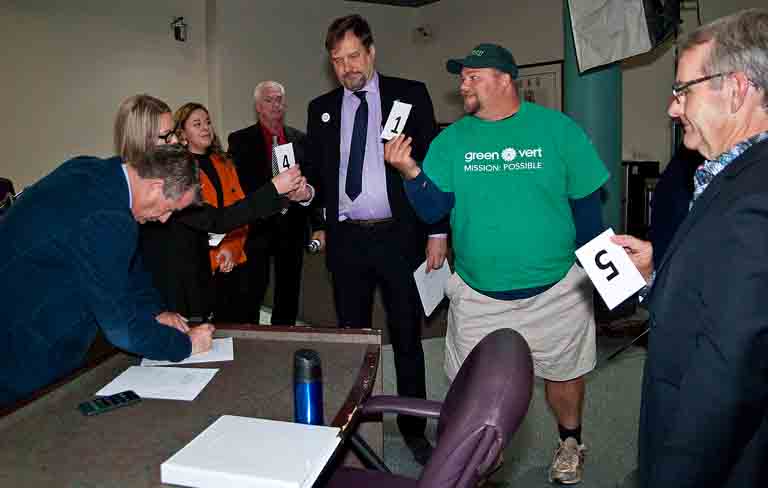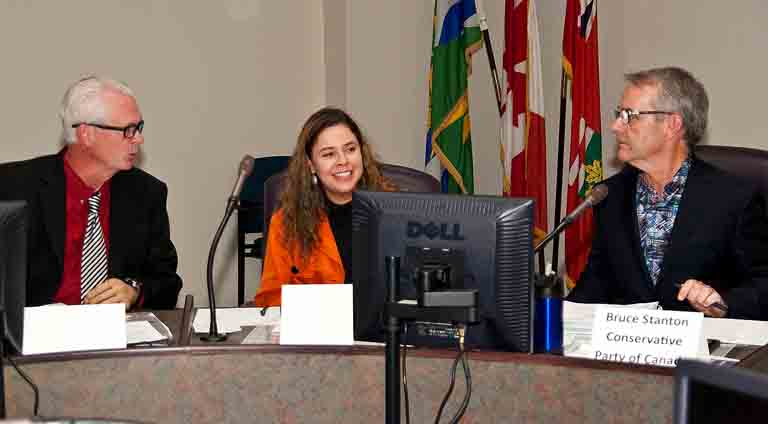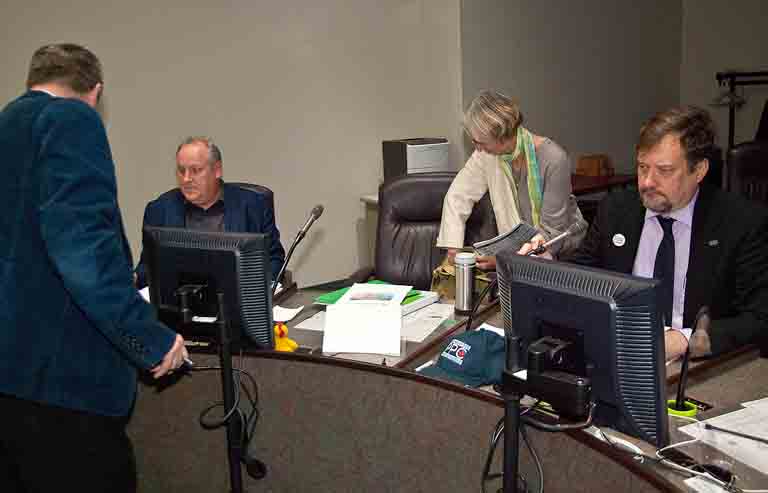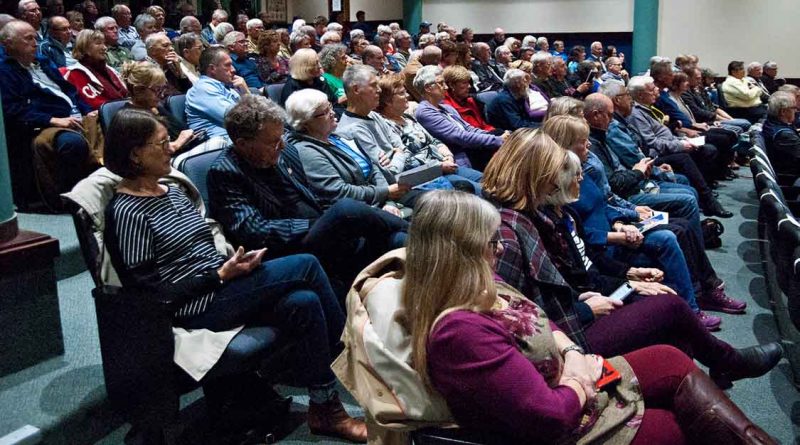Chamber Debate Overview
By John Swartz
Last Thursday’s Orillia District Chamber of Commerce debate played out before a full council chambers at City Hall. All candidates, incumbent Bruce Stanton (Conservative), and challengers Gerry Hawes (Liberal), Valerie Powell (Green), Angelique Belcourt (NDP), Stephen Makk (PPC) and Chris Brown (CHP) were present.
The debate format has changed little in 25 years. Candidates get to make their pitch for 5 minutes each, then face questions the chamber believes are pressing issues. Over the last few debates (provincial, municipal) Lakelands Association of Realtors, co-sponsor of the debates, posed two questions. Media present divide up 30 minutes to ask questions, sometimes getting in two questions each, but not this time. Then remaining time is available for audience members to line up and ask questions before the candidates get a couple minutes each for parting shots. This time there was fairly even coverage of the issues from questioners, unlike the early municipal debates when every other question was about snow removal.

Candidates draw for speaking order for first engagement, while the moderator, Raquel Ness, decided order of response for questions.
Valerie Powell was first. This is her 5th time running for office, having twice run provincially, and twice federally, each time as a Green Party candidate. Her remarks referenced her decision not to run this time in order to give younger nominees a chance to represent the party, but that went south when Erik Schomann resigned his candidacy over a Facebook post joking about Muslims from 12 years ago.
“Our political process can discourage the hopeful. Political mudslinging caused our nominated candidate to resign. The negative attack style of campaigning increases voter apathy, lowering the already low number of people who actually vote,” Powell said.
Predictably, Powell also spoke about the voting system and climate change, two central issues of Green Party planks every election. Powell and party leader Elizabeth May have said tackling climate change is a multi-party effort.
“We will need all MPs from all parties to work together to created a solid climate action plan to avoid a climate catastrophe,” Powell said.

NDP candidate
Angelique Belcourt spoke fluently and naturally in French, as opposed to many candidates who sound like they are speaking French with difficulty. She is Metis and lives in Perkinsfield. Slipping in and out of French was comfortably smooth.
“For those of you who don’t speak French I just introduced myself,” Belcourt said.
She is a social worker and said many of the issues, affordable housing, cost of education, access to and paying for pharmaceuticals, and others should be issues based on what she sees in her profession.
“These are fundamental rights that I believe all Canadians should have and the NDP party platform aligns strongly with my views,” Belcourt said.
Chris Brown, a retired children and youth services worker, represents the Christian Heritage Party. Central to the party’s planks are morality and abortion.
“As our name implies, the Christian Heritage Party strongly believes in the Christian component of our heritage that formed our laws and freedoms, the very same freedoms that is now under threat. I don’t see myself as a politician at all. I know my chances of being elected are remote. It is my hope to encourage you to get closer to God by rejecting the leadership that has sold out God’s blessing on our once great nation and vote for the only true political return to our Christian roots.” Brown said. “I’m new in politics and got involved because many Christian issues, like abortion, seem to have been forgotten about,”
He expressed agreement with party platform issues regarding, censorship, limiting immigration, rejecting climate change and the carbon tax, globalism and political correctness
“This may well be Canada’s last free election before globalism and PC culture snuff out the last traces of our traditional voice,” Brown said.
Stephen Makk is a self employed electronic engineer from Victoria Harbour representing the People’s Party of Canada. He thinks it’s time for voters to break the cycle of Liberal/Conservative hold forming governments.
“It is time to break out of the Liberal, Conservative, deep state duopoly without a distinction,” Makk said. He also said while he is running with a party label, that doesn’t mean he wouldn’t act independently for Simcoe North constituents.
“I would first answer to you. Not to my party. Not to my charismatic and statesman-like party leader Maxime Bernier. Not the entrenched Ottawa system. Not to any interest groups and not the U.N. I would be an MP the way the founders of our country intended, an independent, free representative of the free people of Simcoe North.,” Makk said.
He said what separates his party from the others is they have clearly set out some guiding principles – individual freedom, responsibility, fairness and respect – not just a series of policies. He asked anyone to define what the principles are for the other parties.
He said there is too much government involvement in our lives and it is out of touch with what people want. He said the PPC would reduce taxation in several areas beyond income tax. While a National party may have platform issues worth voting for, it’s not much of a choice if the local candidate does not measure up.
“Please consider that your best representative might not necessarily be with the party you normally prefer,” Makk said, adding Simcoe North is probably going to elect a backbencher anyway.
Bruce Stanton is running his 5th campaign for federal office for the Conservatives. The current deputy speaker of the House of Commons listed a number of things (aiding arts groups, getting money for municipal infrastructure, cleaning Lake Simcoe, establishing Lakehead University, expanding Lake Simcoe Regional Airport, renovations to the Trent Severn Waterway and helping Building Hope/ Lighthouse),
“This is the kind of spending our government should be doing to make our communities stronger to help people get ahead,” Stanton said.
He criticized the Liberals for abandoning their promise to balance the budget, and instead running deficits that are not projected to be balanced until 2040.
“No plan can only mean one of two things, future tax increase or cuts to social programs like health care,” Stanton said. A conservative government will do better he claimed.
“We’ll do that while reigning in the growth of government spending and getting back to a balanced budget within 5 years,” Stanton said.

In turn, Gerry Hawes, Liberal, painted a bleak picture if Conservatives formed the next government, equating the prospect for Canadians already exists in Ontario.
“The Conservative cuts to services in Ontario is creating uncertainty for Ontario families and their complete inaction on climate change, they’re afraid of what would happen with an Andrew Scheer government in Ottawa,” Hawes said.
Hawes was former Simcoe North MP Paul DeVillers right hand and for ten years has worked both the political and administrative side of provincial cultural policy, inferring he is no stranger to how government works and won’t be new to the game if elected.
He outlined the Liberal track record, having increased support for seniors and children which lifted 1 million people out of poverty. He also said the carbon tax is an effective and necessary part of combating climate change and is only one part of a 50 point action plan the government has already set in motion.
“We are helping Canadians across the country take real steps to tackle climate change head on,” Hawes said. To him the choice is clear, continue on with the progressive action, start over, or don’t do anything.
“The choice in this election is clear, we will elect a conservative government that wants to make cuts and move us backwards, or we will choose to move forward and build upon the progress we’ve made,” Hawes said.
Continued in Part Two.
(Photos by Swartz – SUNonline/Orillia)

